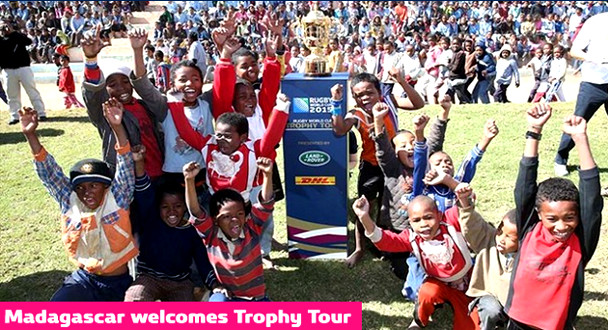 Rugby World Cup helps Tackle Hunger in Madagascar
Rugby World Cup helps Tackle Hunger in Madagascar
Children from schools in the Madagascan capital of Antananarivo benefiting from United Nations World Food Programme (WFP) daily meals have participated in a special Rugby event to promote WFP’s successful Tackle Hunger partnership with the International Rugby Board.
With the Webb Ellis Cup in town for the climax to the African qualification process for Rugby World Cup 2015, a key element of the global Rugby World Cup Trophy Tour, in association with Land Rover and DHL, the children were able to get up close and personal with Rugby’s biggest prize following exhibition matches between girls and boys teams at the Stade Makis, Andohatapenaka.
“This is a wonderful event that will show the huge impact that good nutrition can have on the lives of children from poor households,” said WFP Country Director Willem van Milink.
“Rugby is a passion here in Madagascar and our school meals encourage parents to send their children to school as well as encouraging them to compete in some of their favourite sports.”
Competitors in the Tackle Hunger exhibition match were drawn from a number of educational institutions in Antananarivo where WFP is assisting vulnerable children by providing nutritious meals that contribute to their mental and physical development.
Two teams of girls and boys in the 8-12 year age range competed against teams from the Ecole de Rugby, Ecole de la Vie of the Malagasy Rugby Federation at the Andohatapenaka stadium in Antananarivo.
IRB Vice-Chairman Oregan Hoskins said: “The IRB is delighted and honoured to have such a strong Tackle Hunger partnership with WFP, the world’s largest humanitarian agency fighting hunger worldwide.”
“Rugby players are all too aware of the importance of proper nutrition and a healthy, balanced diet to aid their performance both on and off the field. Thanks to WFP’s great work and the ongoing support of the global Rugby family, we can help win the battle against hunger.”
President of the Confédération Africaine de Rugby (CAR) and IRB Council Member Abdelaziz Bougja added: “On behalf of CAR and the IRB I am delighted that the Tackle Hunger partnership continues to go from strength to strength and I congratulate all the children taking part in today’s exhibition matches.”
WFP is currently working in orphanages and educational centres, providing food assistance to 33,000 vulnerable children in Antananarivo, Toamasina, Toliara and the south-east region of Madagascar. WFP’s assistance aims to promote access to education for children from the poorest communities, as well as to reduce drop-out rates among neglected or abused children.
Chronic malnutrition is widespread in Madagascar, affecting some 47 per cent of children under five years of age, while general food insecurity affects almost one third of the population. WFP programmes in Madagascar focus on providing food assistance to people who are most vulnerable to food insecurity and malnutrition, especially women and children.
Established at Rugby World Cup 2003, Tackle Hunger is a partnership between WFP and the IRB that aims to engage with and mobilise the global Rugby community to raise funds and awareness about WFP’s work on the frontlines of hunger around the world. The partnership focuses on the strong link between good nutrition, mental and physical development and sporting excellence. To find out more about Tackle Hunger, visit www.irb.com/wfp.
The Africa region Rugby World Cup 2015 qualification process concludes on Sunday when Kenya takes on Zimbabwe and hosts Madagascar face Namibia. The overall competition winner after three rounds will join New Zealand, Argentina, Tonga and Georgia in Pool C. The runner-up will face Russia in the Repechage process.
Fans can catch all the action live at irb.com/live and join the conversation @rugbyworldcup.
About the World Food Programme: WFP is the world’s largest humanitarian agency fighting hunger worldwide, delivering food in emergencies and working with communities to build resilience. In 2013, WFP assisted more than 80 million people in 75 countries. Follow the WFP on Twitter @wfp_media.



